#mary gaitskill
Text
I believe that in art, the things you wouldn’t want in real life can be entertained or understood, or even seen and examined.
– Mary Gaitskill
16 notes
·
View notes
Text


The universe needed spaces for power to move into. It liked those spaces and valued them.
gillian rose. love's work
mary gaitskill. bad behavior
379 notes
·
View notes
Text

He longed for a dim-eyed little slut with a big, bright mouth and black vinyl underwear.
Mary Gaitskill, A Romantic Weekend from Bad Behaviour
16 notes
·
View notes
Quote
Her smile is like an open door, and I enter for a second.
Veronica, Mary Gaitskill, 2005
9 notes
·
View notes
Text
“The show the next night is outstanding. He might be evasive in interviews, but on his own turf, Yorke is right there. If this is a carton of skim milk, it’s like a Hans Christian Andersen carton, where you open it up and all kinds of crazy stuff come pouring out, scenes and creatures that form and dissolve with the inky weirdness of dreams. The audience is riveted, straining toward the milk, er, music, stretching their hands up like they’re trying to take it in through their palms. It’s like secret places are being stroked, places that nobody could describe and probably won’t remember when the concert’s over; but it doesn’t matter for the moment because the music just sounds really, really good.”
– Mary Gaitskill on Thom Yorke/Radiohead
11 notes
·
View notes
Text
“I loved [my parents] like you love your hand or your liver, without thinking about it or even being able to see it. But my music made that fleshy love feel dull and dumb, deep, slow, and heavy as stone. Come, said the music, to joy and speed and secret endlessness, where everything tumbles together and attachments are not made of sad flesh. I didn’t know it, but my father was doing the same thing, sitting in his padded rocking chair, listening to opera or to music from from World War II. Except he did not want tumbling or endlessness. He wanted more of the attachment I despised - he just didn’t want it with us. […] I was so attached to my father that I felt this. But I felt it without knowing what it was, and I didn’t care enough to think about it. Who wants to think about their liver or their hand?”
- Veronica by Mary Gaitskill
#I think she really understands pop music as a medium through which we say the unspeakable#Mary Gaitskill
9 notes
·
View notes
Text

-Mary Gaitskill, Veronica
8 notes
·
View notes
Text
MORE Best Short Stories I Would Recommend to Anyone
Because I am a person who changes, since I made my last (apparently very popular?) post about short stories I would recommend, I have read YET EVEN MORE great short stories. Here are some additions I would like to make to that last post, and I hope y'all will seek them out:
"Secretary" - Mary Gaitskill
"The Boarding House" - James Joyce
"Revelation" - Flannery O'Connor
"House Taken Over" - Julio Cortarzar
"The Renegade" - Shirley Jackson
"The Lady of the House of Love" - Angela Carter
"The Interior Castle" - Jean Stafford
"The Man Child" - James Baldwin
"The Frolic" - Thomas Ligotti
"The Erl-King" - Angela Carter
"Blow-Up" - Julio Cortarzar
"An Encounter" - James Joyce
"Something Nice" - Mary Gaitskill
"Like Mother Used to Make" - Shirley Jackson
"Miss Brill" - Katherine Mansfield
"Bestiary" - Julio Cortarzar
"The Outing" - James Baldwin
"The Bloody Chamber" - Angela Carter
"Got a Letter From Jimmy" - Shirley Jackson
"The Echo & the Nemesis" - Jean Stafford
#dark academia#light academia#literature#shirley jackson#james baldwin#james joyce#julio cortázar#jean stafford#katherine mansfield#mary gaitskill#thomas ligotti#flannery o'connor
6 notes
·
View notes
Text
I felt a numbness; I felt that I could never have a normal conversation with anyone again.
Mary Gaitskill, "Secretary," in Bad Behavior
6 notes
·
View notes
Text
This Is Pleasure by Mary Gaitskill - Review
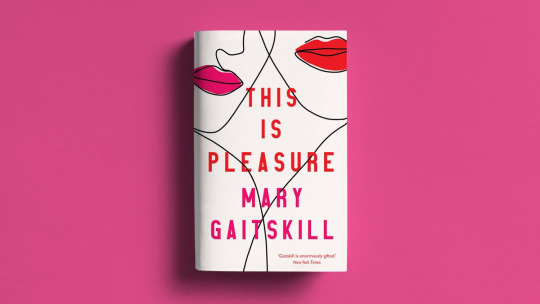
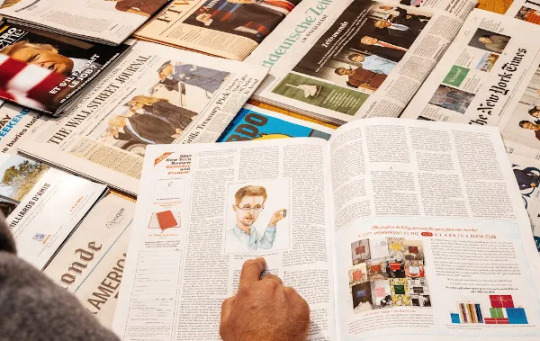
rating: ⭐⭐ (2.5)
This is pleasure is about Quin, a man who has been accused by several women of sexual assault and Margot, a friend of his who is trying to make sense of the accusations.
We get a perspective of both POVs, Quin’s and Margot’s. We see how both of them try to excuse the behavior as “normal”, and while Quin shows no remorse that doesn’t apply to Margot.
This book discusses interesting topics such as “what is considered sexual assault?”; “How far does consent go?”; “What does it mean for the women associated with the accused to remain by their side?”; “Are these women victims themselves?” and it does show that these cases are not black and white, there’s a lot of grey areas, especially regarding the women associated with these men.
With that being said. What did I just read?
“You didn’t touch her, did you? I mean, sexually?” I had not. Just sometimes on the shoulder, or around the waist. Maybe on the knee or the hip. Affection. Not sex.
(…)
She said, “If it wasn’t sexual, you don’t have anything to worry about.”
“But it could be made to sound sexual. Or just—she claims it cost her months of therapy bills.”
Margot laughed again, more meanly—I’m not sure at whom.
The book props the question: What is sexual assault? But never really bothers to answer it. The reader has to draw their own conclusion. Of course that, we as women, know that the interaction above that the two characters are referring to is sexual assault. However who is this book for? If it doesn’t go deeper than the surface on the topic, nor does it answer the questions it proposes, so again I ask who is this book for? Not for women, because we know what these things are, and not for men because it won’t teach them anything, as these questions are unanswered I remain confused.
We could spend whole lunches analyzing her behavior, particularly why she wouldn’t let him stroke her back or even take her elbow to guide her through a room. It was the same conversation, over and over: I lectured about respect and boundaries; he wondered how someone could be so “precious” about herself and declared that he would never refuse the needs of a friend.
Is this book supposed to encourage us, as women to explain to our male friends that we do not welcome foreign touch and why that’s weird? Odd message to send, but I digress. Margot goes to absolute lenghts to justify Quin’s repeated weird behavior towards women. It’s truly horrifying to read. The internalised misogyny really shines in this book (which is one of the most interesting parts in my opinion).
When I say to my colleagues that the women should have just told Quin to stop, that I had told him to stop and had made him stop, they inevitably tell me that the power was disproportionately his, and that even if in theory the women could have pushed back they should not be expected to, they shouldn’t have to.
At least we have a little development in this topic, but it’s never explored further because the book just ends. I really believe the book could have been longer (and i never say this) because it would’ve been more fleshed out and could start really interesting conversations that way.
I still leaned on him for support and counsel. I was like the women who didn’t stop him and who acted like his friends even as they grew angrier and angrier. It wasn’t because he had more power than I did; that didn’t really matter. And it wasn’t because I’m like a horse. I don’t know why I behaved the way I did, and I kept doing it; he kept doing it.
To me the conclusion Margot reaches is the best part of the book even though it left me wanting more. The book proposes many questions but only answers to one: “Are these women associated with the abusers ,victims themselves?”
However its still lacking because this only goes on for a page and this was the crucial part of the novel.
Being in Quin’s head was interesting as it was disgusting, it gives us great insight into the mind of an abuser who is able to manipulate all the people around him. However it doesn’t matter because in the end he suffers little consequences. Yes he’s fired but the narrative is constantly arguing with the reader that it is wrong, that despite everything he’s a good man. The end of the book was just … no I’m still mad.
#booklr#books & libraries#book review#book quotes#books#literature#my reviews#reading#this is pleasure#mary gaitskill#read the trigger warnings#goodreads#storygraph#me too movement
4 notes
·
View notes
Text
I believe that in art, the things you wouldn’t want in real life can be entertained or understood, or even seen and examined.
– Mary Gaitskill
22 notes
·
View notes
Text
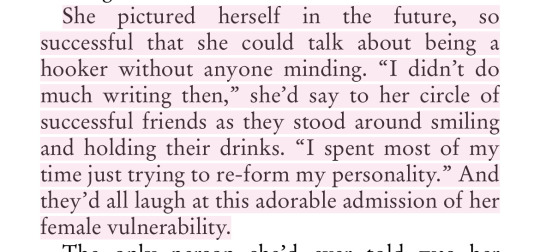
Bad Behavior by Mary Gaitskill
8 notes
·
View notes
Text
"I think a lot of people, especially middle class people, were kind of brought up not to think for themselves. They were told what to think. So when they are put in a situation where they are required to think for themselves, they're in trouble. So they feel victimized without knowing why. They might respond by becoming very passive just going with whatever the other person wants or by becoming aggressive and thinking they have the right to take over the situation, regardless of what the other person wants. Which Is a recipe for date rape. It's weird how people are saying "How could this be happening?" It's always been present in the culture. It's just that before there was an illusion that everybody was doing the same thing, living the same way. Since that illusion has been lost, many people don't know what to do."
Mary Gaitskill interviewed by Alexander Laurence in 1994
#mary gaitskill#victim#middle class#critical thinking#responsability#literature#quotes#secretary#illusion#the myth of meritocracy#lit quotes#quoteoftheday
4 notes
·
View notes
Text
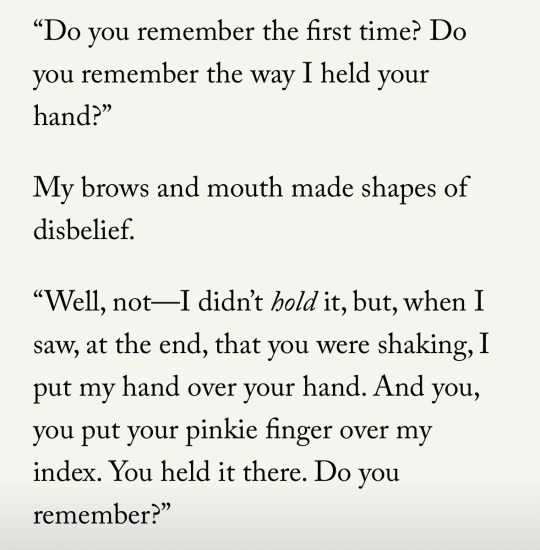

Mary Gaitskill, “Minority Report,” The New Yorker
1 note
·
View note
Photo
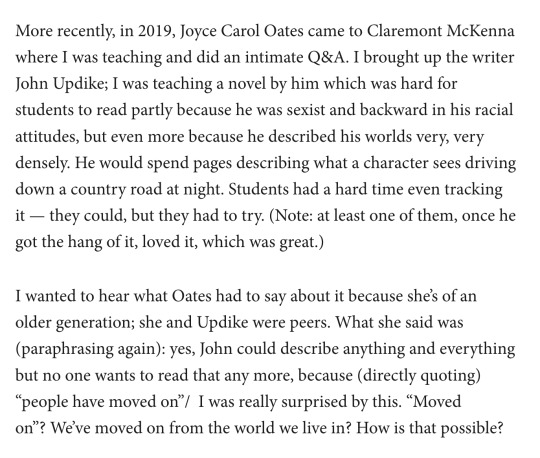
—Mary Gaitskill, “Will Literature Survive?”
If I may:
“Can I ask you something that might annoy you?” she said.
The artist now smiled broadly with his old-world courtliness and said, “Yes, of course, but if you are too annoying I will not answer.”
“Isn’t painting finished?” she said. “Museums, galleries, and art schools are all about installations, performance, multimedia, various kinds of street art, new forms of interactive art. There have even been defenses on these grounds of The Last Café.”
He grunted in disgust at her allusion.
“Then there’s film, video, photography, the Internet. Whatever technological function the canvas served as a way of producing images has been entirely superseded. But even leaving that aside, didn’t art considered in and of itself run its course? Didn’t artists themselves bring it to an end with abstraction and pastiche and collage and blank canvases and soup cans and all of that? They took it to its logical conclusion. There’s not another development anyone can imagine. What reason is there to go on making pictures of people and things after that?”
He nodded as she spoke, his chin bouncing off the top of every word, no doubt because he had already heard every word before, probably in more than one language. Then he painted in silence for long enough to discomfort her. The hairs of the brush scratched against the canvas like a whisper that echoed under the high ceiling of the church.
“The answer is very simple,” he finally said. “I do it only so that it will not be finished. What you say seems as if it is true, but if I am doing it, how can it be finished? Logical conclusion, you say, but we do not live in logic. There is a way of being, of meeting, in this act that does not exist in these others that you mention. On this canvas comes together myself, yourself, this church. All are touching, which cannot happen in the machine, not even in photographs, where the apparatus comes between the mind and the mark and does its work by itself, no human touch. The apparatus itself is some other man’s creation. My rival, so to say. But here is no rival, only my hand, my tool, my mind, your body, your mind, this room, this hour. All touching. This way of things coming together I do not want to see finished, so I do it if nobody else will.”
“And if nobody sees it?”
“You see it, I see it. Are we nothing? You and I are not nothing.”
—Portraits and Ashes
36 notes
·
View notes